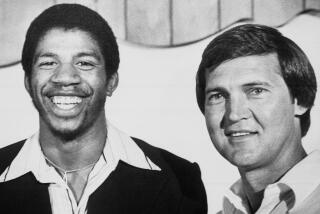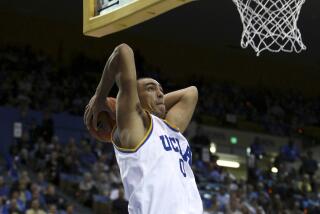PRO FOOTBALL â87 : COACHES, PLAYERS, TEAMS AND TRENDS TO WATCH THIS SEASON : Reggie Rogers Carries the Torch : Brother Don Is an Inspiration to His Career and to Untangling His Life
PONTIAC, Mich. â Reggie Rogersâ life changed not like the seasons, slow and imperceptible, but rather with a blurry suddenness the day his brother Don--his best friend, his hero, really--died of a cocaine overdose.
No one knows for sure exactly what happened. Certainly, Don Rogers, a former UCLA All-American and later All-Pro safety with the Cleveland Browns, had everything to live for. He was only 23, superbly talented, financially stable. He was a rarity of sorts in Cleveland: Someone who enjoyed the beleaguered city and its people, who understood the localsâ ongoing affair with their Brownies. For this, he was cherished, respected and, in a sense, loved.
In June 1986, just a few days before his wedding, Don flew to Seattle to visit Reggie at the University of Washington. These were good times. Don was fast becoming a National Football League star. Reggie was considered one of the finest college defensive linemen in the country, most likely a first-round choice in the 1987 NFL draft.
Rather than return to Sacramento by plane, Don and Reggie decided to drive. It would give them a chance to talk about football, women, cars, family. Didnât matter.
For nearly 12 hours, the length of the drive, they chatted like two old geezers on a porch. They laughed. They reminisced. They dreamed together. A tighter bond you couldnât form with a vise.
Shortly after they arrived home, friends arranged a bachelor party. This would be their final salute. The next day, Don was to be married.
It was a happy gathering, so much so that Reggie and other well-wishers suggested that they move the party to a local nightclub. They left--without Don. It would be the last time Reggie would see his brother alive.
This is the memory he keeps, of Don smiling, of being surrounded by friends and family. This other image, of cocaine and desperate agony, is pushed and shoved aside as best it can be. Sometimes the hurt stays put. Other times it prompts strong emotions--anger, frustration, sadness. Always sadness.
âItâs like a black cloud hanging over my head,â Reggie says in a tired tone. âIâm not ashamed of my brother in no way, shape or form. It was a terrible way that he had to die. But I know there are a lot of people in the league that did, and do right now, more stuff than he did. It was just his time to go. Thatâs the way I feel about it.
âI donât understand why it hangs over my head, though. I just want to let him rest . . . let him rest.â
But this is not a legacy that will go peacefully. For on June 27, 1986, in the early-morning quiet, Don frantically called out to his mother, slipped into a coma and died. And so did a little of Reggie.
Meanwhile, that bothersome cloud, heavy with rumor, innuendo and assorted lawsuits, remains.
A legal scorecard: Two former agents, including the notorious Norby Walters, have chosen to sue Reggie Rogers, reportedly for breach of contract. Rogers has said he accepted money from Walters before the conclusion of his playing career at Washington but argues that the loan was quickly repaid and that any contracts signed are invalid. Both Walters, of New York, and Tacoma-based Pat Healy, also are suing Rogersâ new agent, Steve Zucker, who lists among his clients Bear quarterback Jim McMahon. In return, Rogers is suing Walters and Healy.
âIs this Pick On Reggie Year, or something?â Rogers says. âI want this year to get the hell over with. A hell of a year.â
But each day, it seems, a new calamity.
Want to know what doting, protective employers the Detroit Lions are? Try wresting away Rogers, their No. 1 draft pick, from the friendly confines of the Silverdome practice facility. The public relations policy apparently is this: Private interviews with Rogers are conducted in Lion offices. Anything else preferably requires the attendance of a team official.
Except today. Today, Rogers is hungry and in a hurry. He speaks briefly with the Lion public relations director before climbing into a borrowed Ford Bronco (his Porsche is in the shop). He is leaving. The Lions will just have to trust him.
Strange times in the Motor City. The Lions adore Rogers. They love his size (6 feet 6 inches, 272 pounds), his quickness and speed, his style. They could have had the more celebrated Jerome Brown of the University of Miami. Instead, the Lions found Rogers available after the first six selections.
âIt was a matter of, do you go with a guy with potential, or go with a guy who has been very productive in his career,â says Jerry Vainisi, the Lion general counsel and former Chicago Bears general manager. âWe just felt that (Rogersâ) best football is ahead of him.â
After his first professional quarterback sack, Rogers turned toward the crowd and performed a military salute that would make the fellas at West Point proud. He also isnât against taking a moment or two to watch himself on the stadium big screen. And after the Lions used the seventh pick on him, Rogers said that he would be insulted if opponents used anything less than two offensive linemen to occupy his time.
âWhen he does develop, youâll see that he has a certain amount of crowd appeal because heâs an individual,â Vainisi says. âI know how fans relate to individuals, coming from where I came.â
Rogers is a friendly sort, open, engaging, thoughtful. He has a deep, quirky laugh. There is a charming innocence about him. And maybe thatâs part of the problem.
âA lot of people donât understand Reggie, but I do,â says Jerry Ball, a third-round choice who rooms with Rogers during trips. âHeâs a very sincere person. Heâs got great character and heâs got a free heart. And a lot of people take advantage of him.â
Says Zucker: âHeâs a wonderful guy, very warm, very caring. Heâs very close to his mom. I realize all the things that have come up. But theyâre a bunch of little things. People think heâs a bad egg, but heâs not.â
Despite the testimonials, the Lions act as if they have their fingers crossed:
--On draft day, General Manager Russ Thomas, after introducing Rogers as âReggie Rucker,â told local reporters that Rogers was not among the 28 college seniors who had tested positive for drugs at an NFL camp in Indianapolis. âHe passed (the urinalysis test),â Thomas was quoted as saying in the Detroit News. âHeâs gone to different camps, and heâs continued to stay clean.â Continued? As best as anyone knows, Rogers has yet to flunk one of the paper cup tests.
--After his arrival in Detroit, Rogers was introduced to solid-citizen types such as Mel Farr, a former Lion star and now a successful businessman. They happily approved Rogersâ association with Ball and had team leader Lomas Brown, an offensive lineman, offer his time and advice.
--Although the speech wasnât directed exclusively toward Rogers, the Lions asked Gil Hill, once among the cityâs finest homicide detectives, to inform the rookies of people and places to avoid in Detroit. You may have seen Hill; he played a Detroit chief detective in the movie, âBeverly Hills Cop.â
Rogers is no dummy. He knows what is happening: The Lions are protecting their $1.775-million investment. History dictates it, they say.
âI donât know if itâs fair,â Thomas says, âbut the unfortunate side of that association (between Don and Reggie) will cause people to become more aware of potential (problems). You say maybe heâs going to be more closely looked at by people looking for errors. That reputation of the brother and that association is something (Reggie) is going to have to live with, unfortunately, for the rest of his life.â
Says Rogers: âThis didnât start until my brother died. Everything started to go downhill as soon as he died. Every day, something happened.â
Donâs death, which happened just eight days after the drug-induced death of Maryland basketball star Len Bias, forced administrators and coaches--college and pro, alike--to re-examine current testing policies. Caught in the middle was Rogers.
âI took a damn blood test for the Detroit Lions,â he says. âYou know how far a blood test goes back? That goes back months. Up in Seattle, I volunteered for (testing). No one else on the (Washington) team did that. I did it because they knew how close my brother and I were. I just wanted to clear my name. I didnât want people to whisper it behind me.â
Next came his dealings with Walters and later, Healy. Walters had been trying to recruit Rogers as a client for months. As was his practice, Walters offered attractive loans and advances, even if it violated a National Collegiate Athletic Assn. rule prohibiting players from receiving money while still eligible.
At first, says Rogers, he declined Waltersâ offer of money. Later, he says he accepted a $5,000 advance.
âMy mom had gotten money from the Browns (after Donâs death) . . . but I didnât want to take any of it or bother her,â he says. âThatâs why I took the money from Norby, because I didnât want to take any money from my mom. I didnât want her to have any more worries. Thatâs why I did it, plus I thought it was all right. When someone plops $5,000 in cash and you got $100 in the bank, well, I donât know too many people who are going to walk away from something like that.
âBefore Don went pro, I used to damn near starve . . . donât eat a thing on Sundays, stuff like that,â he says. âI was at Washington and all that stuff I did for them, they didnât get me a job until my senior year. Then I worked like hell. It was construction, and I worked for every little penny. I thought I should have been paid more. I worked harder, then, than I do now. Sometimes, I want to go back and buy that damn company.â
A dream, says Rogers, which had Don standing at the edge of the bed, crying, extending his hand, caused Reggie to re-examine the ethics of the advance. The next day he called the NCAA and was told that Walters had compromised Rogersâ eligibility.
So, Rogers hired Healy, who arranged for a loan so Rogers could repay Walters (with 12% interest, Rogers says). Walters also was informed by Rogersâ representatives that his contract was null and void.
Too late. The incident, which occurred shortly before Washingtonâs appearance in the Sun Bowl, was front-page news in Seattle newspapers.
âPeople in Seattle made me seem like the bad boy,â he says. âI did something wrong, but then I got it taken care of. I mean, 48 hours. How they can hold something like that against me. It ainât like I killed somebody.
âI felt like it turned on me, like the whole city turned against me.â
Rogers would later part with Healy, claiming that the agent was more concerned about his percentage than his clients.
Healy and Walters declined to return phone calls concerning Rogers.
Rogers visited the police blotter, too, while at Washington. An argument with his former girlfriend over the ownership of a Gucci purse prompted Rogers to push her away . . . and into a wall. The former girlfriend wasnât injured, but a report by a witness convinced the city attorneyâs office to charge Rogers. As part of his one-year deferred sentence, Rogers must attend an anger management class. He is looking for such a program in the Detroit area.
âIâm going to see if that (class) works,â he says. âCan you believe this? Iâve got to beat people up for a living and then I got to go to anger management.â
As if Rogersâ image hadnât taken enough of a beating, there was this post-NFL draft contribution from Tom Braatz, personnel director of the Green Bay Packers, who told the Green Bay Press Gazette: âYou wouldnât believe what we found out about the guy. It was enough to know we shouldnât draft him.â
This came as news to the Lions, who pride themselves on thoroughness. They knew Rogers came with strings attached but nothing as serious as the reported hints that Braatz was dropping. âIâm sure (Rogersâ) family reputation caused some clubs to dig a little deeper than usual,â Vainisi says. But unlike some NFL teams, the Lions chose to do without private investigative firms when researching their potential draft picks. Vainisi says the team is satisfied with its own system and the results. âWe put a high emphasis on the character of the players we draft,â he says.
Zucker and Rogers were outraged by Braatzâs comments, since denied, by the way. Zucker, who was trying to negotiate a contract at the time, says, âIt was just like Joseph McCarthy.â
Rogers remains bitter. âI donât know whatâs going to happen when we play against the Packers (Oct. 11),â he says. âI just hope that they donât play me too much. Iâm really going to be out to prove something that day, to him and to the people of Green Bay. I mean, that was just unnecessary. I wish (Braatz) was an offensive tackle, to tell you the truth. I wish he was because Iâd kick his . . . Because that didnât need to be said.â
Perhaps what upsets Rogers more than anything is his damaged reputation in Seattle. He said he feels betrayed by the cityâs media, by the university and its fans. He finds it interesting that Seattle embraces its newest citizen, Seahawk linebacker Brian Bosworth, but treats Rogers, he said, like an outcast.
Less than four months remain in this, Rogersâ second straight year of despair. He has been sued, tested for drugs, held up to a searchlight for defects. He looks after his mother in Sacramento, his 2-year-old daughter in Seattle, his brotherâs son in Sacramento. He must live his own life and then defend another, Donâs. It is tiring work.
âAnd they wonder why I mess up on plays sometimes,â he says, laughing that goofy laugh. âThey wonder why I go the wrong way. They say, âYou got to block that out and play football.â Who do they think I am, Superman? Youâve got to think about that stuff sometimes. I mean, you try. Let me give you all my problems and let me take yours. You come to work smiling every morning.â
While trying to remove the mud that cakes his own name, Rogers is also sprucing up the memory of his brother. A Pop Warner League team in Sacramento, funded in part by Rogers, is a touching gesture. On Rogersâ hand towel that hangs from his Lion uniform is the No. 20--Donâs jersey number. And every tackle, every sack, Rogers says, will be inspired by his brother.
âHeâs pushing himself to be the best that he can because his brother was one of the best,â Ball says. âI admire the hell out of him for that.â
Thereâs a new concept: Someone admiring Reggie.
âI donât worry about it,â Rogers says. âI think Don is pretty much proud of me. I mean, I donât feel sad. I wish some of this stuff would go away, but I donât feel sad. Considering all the bull thatâs going on, Iâm happy.â
More to Read
Go beyond the scoreboard
Get the latest on L.A.'s teams in the daily Sports Report newsletter.
You may occasionally receive promotional content from the Los Angeles Times.










